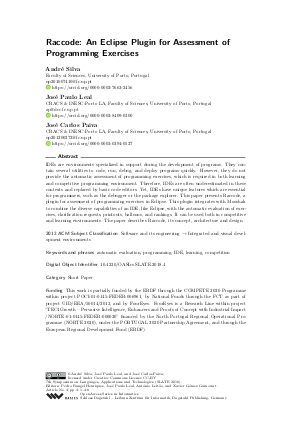Raccode: An Eclipse Plugin for Assessment of Programming Exercises (Short Paper)
Authors
André Silva  ,
José Paulo Leal
,
José Paulo Leal  ,
José Carlos Paiva
,
José Carlos Paiva 
-
Part of:
Volume:
7th Symposium on Languages, Applications and Technologies (SLATE 2018)
Part of: Series: Open Access Series in Informatics (OASIcs)
Part of: Conference: Symposium on Languages, Applications and Technologies (SLATE) - License:
 Creative Commons Attribution 3.0 Unported license
Creative Commons Attribution 3.0 Unported license
- Publication Date: 2018-07-13
File

PDF
OASIcs.SLATE.2018.4.pdf
- Filesize: 460 kB
- 8 pages
Document Identifiers
Subject Classification
ACM Subject Classification
- Software and its engineering → Integrated and visual development environments
Keywords
- automatic evaluation
- programming
- IDE
- learning
- competition
Metrics
- Access Statistics
-
Total Accesses (updated on a weekly basis)
0PDF Downloads0Metadata Views
Abstract
IDEs are environments specialized in support during the development of programs. They contain several utilities to code, run, debug, and deploy programs quickly. However, they do not provide the automatic assessment of programming exercises, which is required in both learning and competitive programming environment. Therefore, IDEs are often underestimated in these contexts and replaced by basic code editors. Yet, IDEs have unique features which are essential for programmers, such as the debugger or the package explorer. This paper presents Raccode, a plugin for assessment of programming exercises in Eclipse. This plugin integrates with Mooshak to combine the diverse capabilities of an IDE, like Eclipse, with the automatic evaluation of exercises, clarification requests, printouts, balloons, and rankings. It can be used both in competitive and learning environments. The paper describes Raccode, its concept, architecture and design.
Cite As Get BibTex
André Silva, José Paulo Leal, and José Carlos Paiva. Raccode: An Eclipse Plugin for Assessment of Programming Exercises (Short Paper). In 7th Symposium on Languages, Applications and Technologies (SLATE 2018). Open Access Series in Informatics (OASIcs), Volume 62, pp. 4:1-4:8, Schloss Dagstuhl – Leibniz-Zentrum für Informatik (2018)
https://doi.org/10.4230/OASIcs.SLATE.2018.4
BibTex
@InProceedings{silva_et_al:OASIcs.SLATE.2018.4,
author = {Silva, Andr\'{e} and Leal, Jos\'{e} Paulo and Paiva, Jos\'{e} Carlos},
title = {{Raccode: An Eclipse Plugin for Assessment of Programming Exercises}},
booktitle = {7th Symposium on Languages, Applications and Technologies (SLATE 2018)},
pages = {4:1--4:8},
series = {Open Access Series in Informatics (OASIcs)},
ISBN = {978-3-95977-072-9},
ISSN = {2190-6807},
year = {2018},
volume = {62},
editor = {Henriques, Pedro Rangel and Leal, Jos\'{e} Paulo and Leit\~{a}o, Ant\'{o}nio Menezes and Guinovart, Xavier G\'{o}mez},
publisher = {Schloss Dagstuhl -- Leibniz-Zentrum f{\"u}r Informatik},
address = {Dagstuhl, Germany},
URL = {https://drops.dagstuhl.de/entities/document/10.4230/OASIcs.SLATE.2018.4},
URN = {urn:nbn:de:0030-drops-92621},
doi = {10.4230/OASIcs.SLATE.2018.4},
annote = {Keywords: automatic evaluation, programming, IDE, learning, competition}
}
Author Details
Funding
This work is partially funded by the ERDF through the COMPETE 2020 Programme within project POCI-01-0145-FEDER-006961, by National Funds through the FCT as part of project UID/EEA/50014/2013, and by FourEyes. FourEyes is a Research Line within project "TEC4Growth - Pervasive Intelligence, Enhancers and Proofs of Concept with Industrial Impact /NORTE-01-0145-FEDER-000020" financed by the North Portugal Regional Operational Programme (NORTE 2020), under the PORTUGAL 2020 Partnership Agreement, and through the European Regional Development Fund (ERDF).
References
-
Helder Patrick de Pina Correia. Avaliação de diagramas no Mooshak 2.0. Master’s thesis, Universidade do Porto, 2017.

-
Roy Thomas Fielding. Architectural styles and the design of network-based software architectures. PhD thesis, University of California, 2000.

-
Andreas Kornstadt and Eugen Reiswich. Composing systems with Eclipse rich client platform plug-ins. IEEE Software, 27(6):78-81, 2010.

-
José Paulo Leal and Fernando Silva. Mooshak: A web-based multi-site programming contest system. Software: Practice and Experience, 33(6):567-581, 2003.

-
Jeff McAffer, Jean-Michel Lemieux, and Chris Aniszczyk. Eclipse rich client platform. Addison-Wesley, 2010.

-
Wassim Melhem and Dejan Glozic. PDE does plug-ins. Technical report, IBM Canada Ltd., 2003.

-
Jakob Nielsen and Thomas K. Landauer. A mathematical model of the finding of usability problems. In INTERACT'93 and CHI'93 conference on Human factors in computing systems, pages 206-213, 1993.

-
José Carlos Paiva, José Paulo Leal, and Ricardo Alexandre Queirós. Enki: A pedagogical services aggregator for learning programming languages. In Conference on Innovation and Technology in Computer Science Education, pages 332-337, 2016.

-
Matthew Scarpino, Stephen Holder, Stanford Ng, and Laurent Mihalkovic. SWT/JFace in action. Manning, 2005.

-
Lars Vogel. Contributing to the Eclipse IDE Project: Principles, Plug-ins and Gerrit Code Review. Lars Vogel, 2015.

